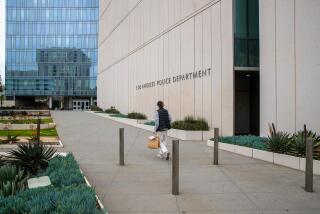Paul Peek Dies; Served in 3 Branches of Government
Paul Peek, believed to have been the only Californian to serve as a top-level official in the legislative, executive and judicial branches of government, is dead at 82.
The retired justice of the State Supreme Court, Speaker of the Assembly and secretary of state, died Tuesday in a Sacramento hospital. He had left the state high court in 1966 citing health reasons after having gone through what he described as a period of “complete nervous exhaustion.”
That was after Peek drew the wrath of the electorate for writing a judicial decision that overturned Proposition 14, the voter-approved initiative that nullified the Rumford Fair Housing Act. Although he had been one of the most popular figures in the state, his majority decision to modify the Rumford Act, which prohibited discrimination in the sale or rental of public housing, produced 1.73 million votes against his reelection to the high court. He was favored, however, by 2.8 million voters.
“A few years ago I was the greatest-vote getter in the state of California,” Peek said of his long political career as he resigned. “This year (1966) I was low man on the totem pole.”
Peek’s career ran a gamut of territory, controversy and popularity.
A lifelong Democrat, he had been elected Speaker of the Assembly in 1939 and was closely allied with Gov. Culbert L. Olson. That alliance led to his downfall when he was accused of having a direct telephone line from his rostrum to Olson’s office. Assemblymen in both parties joined forces to remove him from the speakership, and when Gordon Garland, a Tulare Democrat, took over the Speaker’s chair, one of his first acts was to defiantly yank the phone line from the podium.
Peek moved to California from Iowa as a boy and studied at schools in Long Beach before graduating from the University of Oregon and Southwestern University Law School. He was in private practice from 1930 to 1936, when he first was elected to the Assembly.
He resigned from the Assembly in 1940 to accept an Olson appointment as secretary of state but was defeated by Frank Jordan when he sought election to that office in 1942.
That same year Olson named him to the District Court of Appeal, where he served until his 1962 elevation by Gov. Edmund G. (Pat) Brown to the Supreme Court. On the appellate court, his 1956 decision upheld the legality of offshore islands for tidelands oil drilling.
Civil Rights Backer
On the high court, he was known for his opposition to the death penalty and his support of civil rights. He was among the justices who struck down the loyalty oaths once required at the University of California.
Peek also was a member of the State Judicial Council from 1946 to 1950 and an ex officio regent of the University of California in 1939 and 1940.
Supreme Court Justice Stanley Mosk said Wednesday of his former colleague: “Paul Peek was a warm and compassionate human being and a distinguished public servant. California has lost a great citizen and I have lost a cherished friend.”
Survivors include his wife, Elizabeth; a daughter, a son and four grandchildren.
More to Read
Start your day right
Sign up for Essential California for news, features and recommendations from the L.A. Times and beyond in your inbox six days a week.
You may occasionally receive promotional content from the Los Angeles Times.






